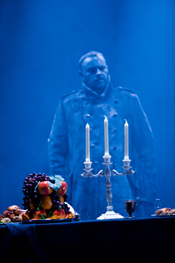06 Apr 2008
DON GIOVANNI – English Touring Opera
The last of the three operas on ETO's Spring 2008 tour was sung in English, and updated to a Spain of the mid-twentieth century under Franco.

The last of the three operas on ETO's Spring 2008 tour was sung in English, and updated to a Spain of the mid-twentieth century under Franco.
The updated scenario presented the usual problems over how to deal with the plot's all-important class hierarchy, and although having the Don as a high-ranking officer went some way towards solving the problem, the idea wasn't really followed through to create a coherent structure to accommodate all the characters.
That said, it was the strongest of the three productions, directed by Jonathan Munby, and was to all intents and purposes an uncomplicated, gimmick-free staging, true to what Mozart and Da Ponte surely envisaged. The very idea of having the Commendatore in a 'statue' costume and turning up to supper seems to be oddly out of fashion these days, and tends to be passed over in favour of a bloodied reanimated corpse or a drug-induced hallucination invisible to the audience. But there indeed he was, played by the bass-baritone Andrew Slater with a presence and strength which made it easy to forget his rather youthful appearance.
Also refreshing was the casting of Jonathan Gunthorpe as a Leporello similar enough in build and looks to his master to be mistaken for him on a dark night with little suspension of disbelief. It helped that Roland Wood's Don Giovanni was played as more of a thug than a gentleman; even their voices weren't vastly dissimilar. But for the difference in the quality of their wordly goods, they were practically interchangeable, and one suspected that had Leporello been born into the moneyed aristocracy, the seeds of depravity and insatiable lust might have had the chance to germinate in him as they did in the Don.

These two were vocally the strongest in the cast; all the others were serviceable, though unusually for this company there were several foreign cast members, including Eyjólfur Eyjólfsson (Don Ottavio) whose sung English was particularly difficult to comprehend. As Zerlina, Ilona Domnich also had some enunciation problems, especially at her first entrance (even though under Michael Rosewell's baton it was taken at a fairly steady pace) but she had a graceful stage presence and sang both her arias attractively and with opulent tone. Julia Spørsen's Donna Anna was an interesting creation, too, combining fragility with noble determination and steely-voiced coloratura.
The Prague version was used as the starting point with a few further cuts, and Soutra Gilmour's all-purpose framework set (shared by the other two productions on the tour) was used here to its best effect, with attractive deep blue latticed walls and backlighting.
Ruth Elleson © 2008